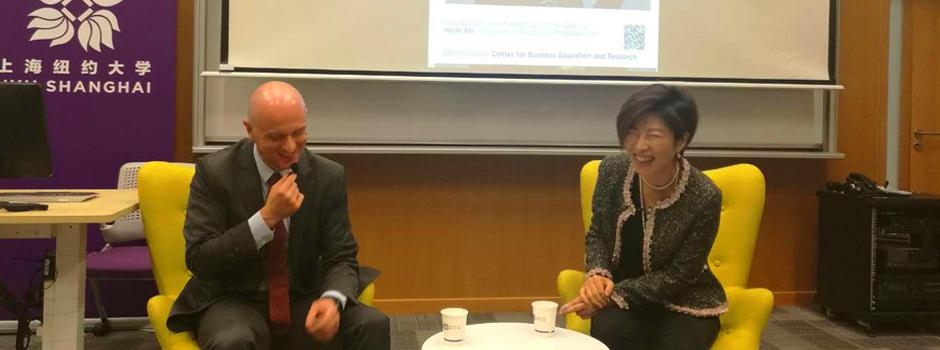Mirko Bordiga, CEO of Maserati and Alfa Romeo China, engaged heartily with the NYU Shanghai community on Nov 2nd with his insights into both the growing appeal of Italian cars in the Chinese market, and how his company might grow further under China’s industrial and consumption upgrade in the new era.
The conversation, conducted by Professor of Practice in Management Heini Shi, was co-sponsored by the Center For Business Education And Research (CBER). This encounter is part of a broader effort by Prof. Shi to introduce her classes and the wider NYU Shanghai community to business leaders.
Kickstarting the event, H.E. Stefano Beltrame, Consul General of Italy in Shanghai, presented to the roomful of students, faculty and friends of NYU Shanghai Italy’s large number of prestigious global brands, especially in fashion, luxury and automotive.
Asked about the significance of brands, Mirko Bordiga talked about them - whether his own or those of his German competitors - as having a “history” and the Italian way of “care for details,” pointing out that Maserati’s brand appeals to people who like to stand out and share their personal preference yet remain low profile, so it can be interpreted as a understated luxury product. “Maserati has carried on its sporty heritage since birth while developing, ever since, the nuance of enjoying life,” he said.
Bordiga spoke about Maserati’s experience of the Chinese market in response to several questions. Established in Bologna in 1914, Maserati came to China only in 2004. A decade later, China has emerged as its biggest market, with sales volumes exceeding 12,000 vehicles last year.
In a market where their customers are, on average, 20 years younger and nearly half of whom are female (40%), as compared to Maserati’s older (average age of 55) and male dominated (95%) global markets, the Italian CEO underscored that Maserati remains “a very niche, exclusive and targeted brand. We do not compete in size, we compete in image and quality.”
Addressing questions about his company’s future plans in China, Bordiga talked about his team’s work to expand Alfa Romeo’s presence in the Chinese market. Unlike Maserati, which trends toward the middle-aged upper class, Alfa Romeo’s “cool sportiness” attracts a wider range of consumers. Highlighting the deep connection Alfa Romeo enjoys among Italians of all stripes, Bordiga described it as “the brand of the Italians.” Commenting on its prospects, he said, “although Alfa Romeo has only been in China for six months, we have successfully raised its brand awareness from 4 percent to 14 percent, after the first round of promotion. The outlook for Alfa Romeo is bright for sure.”
Addressing students who are thinking about their future careers, Bordiga shared, with good humor, his own experiences. Catching his audience off guard, he talked about starting off his career as a frozen food buyer for a supermarket chain. His entry into the automotive sector came a few years later when he jumped on an opportunity to join prestigious Ducati Motor in 1998 in Japan. Eventually, Bordiga came to China in 2004 where he has lived and worked ever since. Known as a business leader experienced at tapping into the potential of emerging markets, Bordiga has helped to lead high-profile luxury brands across the Asia Pacific, including Ducati, Ferrari, McLaren and Maserati.
Bordiga has also become an expert in understanding cultural specificities. “Companies need to adapt to different markets and learn about customer preferences,” he said. “Asia is just a geographic expression -- each country and culture is extremely different.”


